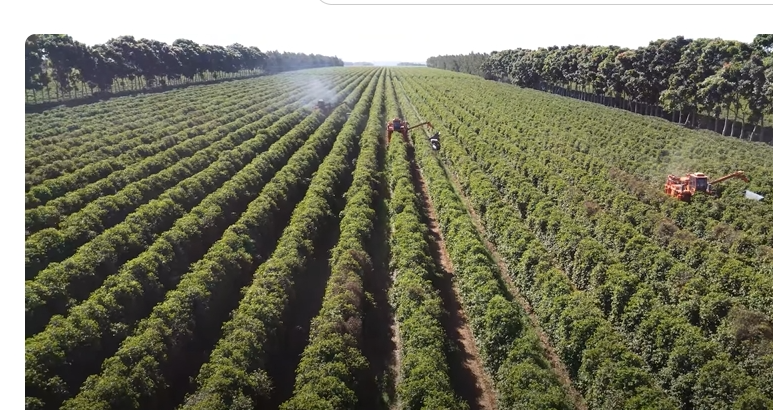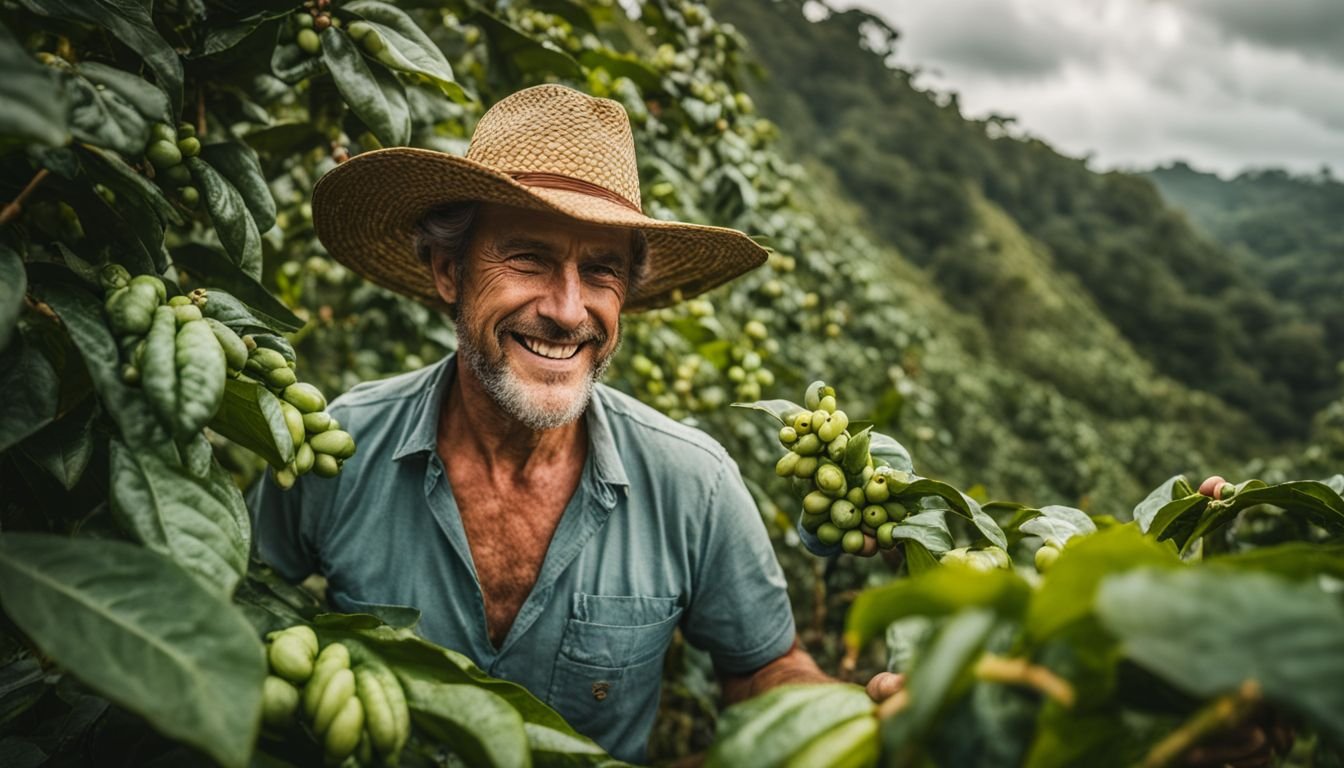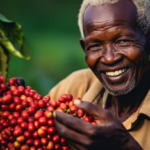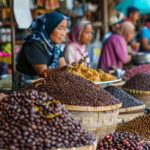Are you searching for a coffee experience that goes beyond your morning cup? Perhaps, you’re eager to explore the depths of coffee traditions and flavors yet undiscovered. Brazil, one of the largest coffee producers globally, is not just about quantity but also about an exceptional range of aromas and tastes.
This nation’s vast landscapes and diverse climates craft coffees as rich and varied as its culture.
Here’s a fact that might intrigue you: Brazilian specialty coffees offer an adventure for the senses with unique profiles from different regions – imagine sipping a cup that carries hints of chocolate or tropical fruits! Our article dives deep into Brazil’s fascinating coffee culture.
We’ll uncover its history, take you through its cherished rituals, introduce you to the prime coffee regions, and guide you on how to enjoy Brazilian brews like a local.
Get ready for an immersive journey into Brazilian coffee culture. Let’s get brewing!
Key Takeaways
- Brazilian coffee culture has a rich history starting when Portuguese explorers brought the coffee plant to Brazil from French Guiana. Coffee quickly became a big part of Brazil’s economy, especially with the help of the Port of Santos.
- Brazil is famous for its diverse climates which are perfect for growing different types of coffee beans like Arabica and Robusta. Each region in Brazil, such as São Paulo, Espírito Santo, Sul de Minas, Rio de Janeiro, and Matas de Minas offers unique flavors.
- Traditional brewing methods like using a “coador” (cloth strainer) or preparing a “cafezinho” (small black coffee) play important roles in enjoying Brazilian coffee. These customs highlight the value Brazilians place on community and shared experiences.
- Sustainability is key in Brazilian coffee production with farmers focusing on eco-friendly practices. This includes small farm sizes or micro-lots and following strict environmental rules to make sure their work benefits both nature and quality.
- Innovations in farming technology and research into new kinds of resilient coffee plants are helping improve Brazilian coffee quality. Advances include using drones for monitoring crops and machines that assist in picking beans more efficiently.
Exploring Brazilian Coffee Culture

Dive into the heart of Brazilian coffee culture and discover its rich history. Learn how traditions and modern practices blend to create unique coffee experiences.
History of Brazilian Coffee
Early Brazilian Coffee Overview
Coffee first arrived in Brazil back in 1727 when Commander de Melo Palheta brought seedlings from French Guiana to the state of Pará. However, early cultivation efforts faced difficulties – the ban on slavery in French Guiana barred crucial labor while conflicts erupted with indigenous groups over land use rights.
But Brazil’s coffee story transformed after the Dutch smuggled productive coffee varieties from Java. Coffee plantations began dotting the landscape, relying on slave labor imports to fuel intensive work. By the early 19th century, Brazil became the world’s largest coffee producer.
As the world’s top producer for over 150 years now, Brazil’s coffee history chronicled the rise of an export giant intertwined with societal evolution, while continuous innovation poises Brazil to keep leading global coffee into the future.
Portuguese explorers first brought the coffee plant to Brazil from French Guiana. This happened long ago, and soon after, coffee plantations started popping up around Rio de Janeiro and Sao Paulo during the 18th and 19th centuries.
The growth of these plantations marked the beginning of Brazil’s journey to becoming a leader in the global coffee industry.
The Port of Santos played a key role in this development. It became the main hub for transporting Brazil’s coffee to different parts of the world. Thanks to this port, Brazilian coffee could easily reach international markets, helping Brazil earn its place as a top coffee producer on a global scale.
Traditional Coffee Rituals & Customs
In Brazil, you’ll find people using a cloth strainer called “coador” to brew their coffee. This method brings out the unique flavors and aromas of Brazilian coffee beans. Enjoying a “cafezinho,” which is a small, strong black coffee, is another cherished tradition.
It embodies the spirit of Brazilian coffee culture, offering a deep dive into its rich history.
Gatherings with friends and family often center around these coffee rituals. These social moments underscore the importance of community in Brazilian life. Sharing a cup of cafezinho is more than just drinking coffee; it’s an act of hospitality and friendship that strengthens bonds and celebrates Brazilian heritage.
Evolving Specialty Coffee Industry
The specialty coffee industry in Brazil is booming. Farmers and producers are using ethical methods to ensure both the environment and coffee quality benefit. They focus on innovative approaches, like micro-lot farming and direct trade practices.
This allows for a unique taste experience with every cup, highlighting the distinct flavors of Brazilian beans.
Coffee lovers now have access to an array of single-origin and artisan coffees, thanks to these sustainable practices by top brands. As a result, the industry is not just growing; it’s evolving towards healthier plantations and happier communities.
Let’s take a closer look at some key regions contributing to this vibrant culture next.
Brazilian Coffee Regions & Growing Conditions

Brazil boasts diverse climates perfect for coffee growing. Each region offers unique flavors to the beans, shaping Brazil’s rich coffee landscape.
São Paulo
São Paulo has carved its name deeply into the heart of Brazil’s coffee production. This region not only influences the flavor and quality of beans but also stands as a vibrant hub for coffee lovers.
With a diverse range of growing conditions, São Paulo offers an array of coffee flavors and aromas, enriching Brazil’s vast coffee culture.
In this lively area, you’ll find numerous coffee shops that serve delicious drinks with great atmospheres. These spots are perfect for tasting the local specialties and immersing yourself in the authentic Brazilian coffee experience.
The state’s rich history in coffee cultivation adds a unique depth to every cup you enjoy here.
Espírito Santo
Espírito Santo shines as a key player in Brazil’s coffee production. This region specializes in growing Robusta beans. These beans are celebrated for their strong flavor and earthy tones, making them a favorite among those who love a potent cup of coffee.
Farmers in Espírito Santo work hard to cultivate these robust beans, ensuring they pack the unique tastes that coffee enthusiasts seek.
The area takes pride in its ability to produce high-quality Robusta beans that contribute significantly to Brazilian coffee exports. With its rich soil and ideal climate conditions, Espírito Santo helps Brazil stay at the forefront of global coffee production.
Coffee lovers often look for products from this region when they want a bold and invigorating brew that stands out on the palate.
Sul de Minas
Sul de Minas stands out for its high-quality coffee beans that boast unique flavor profiles. This region’s growing conditions play a crucial role in shaping the taste of Brazilian coffee, making each sip a distinct experience.
Coffee cultivation is not just an activity here; it’s part of Sul de Minas’ cultural and economic essence. Local farmers pour their dedication into producing top-notch beans recognized worldwide.
Visitors have the opportunity to dive deep into the world of coffee through farm tours in Sul de Minas. These tours offer a close look at the harvesting process, revealing why this area is celebrated for its contribution to Brazilian coffee culture.
The commitment of local experts ensures each bean from Sul de Minas adds to Brazil’s reputation as a leading coffee producer with unparalleled tasting experiences.
Rio de Janeiro
Rio de Janeiro boasts stunning coffee farms nestled at perfect altitudes for Arabica beans. The tropical climate here enriches the flavor, making these beans highly sought after. Coffee lovers find joy in exploring these lush plantations, where they can witness first-hand the care and dedication that goes into every cup.
In the city itself, vibrant coffee shops serve as bustling hubs of Brazilian coffee culture. These spots offer a wide array of great-tasting beverages, from traditional Cafézinho to modern Brazilian espresso variations.
Visitors love soaking up the lively atmosphere while savoring some of the best coffees Rio has to offer.
Matas de Minas
Matas de Minas boasts a unique spot in the heart of Brazilian coffee culture. Here, high altitudes, well-defined seasons, and rich soil come together to create perfect conditions for growing high-quality coffee beans.
This region is celebrated for its artisanal approach to coffee production, with farmers focusing on sustainable practices.
You’ll find that coffee from Matas de Minas has distinct flavors due to its optimal growing conditions. The area supports both Arabica and Robusta beans, giving enthusiasts a variety of tastes and aromas to explore.
Next up, let’s dive into the types of Brazilian coffee beans and what makes each special.
Types of Brazilian Coffee Beans
Brazil grows Arabica and Robusta beans, each offering unique flavors. Dive deeper to discover how these beans shape Brazil’s coffee culture.
Arabica Beans
Arabica beans hold the crown as the most widespread type of coffee bean in Brazil. These beans charm with their smooth, mild flavors that dance with hints of sweetness and acidity.
Grown at higher altitudes, these conditions nurture a unique flavor profile, making them a prime choice for specialty coffee blends and single-origin coffees. Their high quality and versatile nature allow for an exploration through light to medium-dark roasts, each unveiling different facets of the Arabica bean’s taste.
Roasters love working with Brazilian Arabica beans because they adapt well across the roasting spectrum. From light to medium-dark, changing roast levels highlight various flavor notes ranging from fruity sweetness to subtle chocolate undertones.
This flexibility makes them perfect for coffee lovers looking to explore different tastes within Brazil’s rich coffee culture. Whether in a blend or standing alone as a single-origin brew, these beans provide a delightful journey through Brazil’s diverse landscape of flavors.
Robusta Beans
Robusta beans in Brazil pack a bold flavor with earthy tones. They grow best at lower altitudes, making them unique compared to other varieties. This bean offers a stronger, more intense coffee experience for those who appreciate a robust cup.
Brazilian farmers are turning towards eco-friendly methods to cultivate Robusta beans. They focus on sustainable farming and use renewable energy to produce small batches. This approach ensures each batch has the best flavor while caring for the planet.
Leading Arabica Types
Bourbon – Originating on the Indian Ocean island of Bourbon, these plants grown from older Typica stock produce heavy yields of large, flavorful beans well-suited for medium and low roasts. Bourbon’s versatility makes it widely cultivated.
Mundo Novo – This Bourbon/Typica hybrid bears quality fruit with good yields. Smooth and consistent with chocolate notes, it adapts across Brazil’s Arabica growing regions.
Catuaí – Created by crossing Mundo Novo and Caturra, Catuaí produces high yields of aromatic beans with bright acidity. It currently dominates Minas Gerais production.
Icatu – Also bred from Mundo Novo, Icatu thrives in cooler high altitude regions, producing highly aromatic, sweet, low acidity beans.
Now, let’s explore the Brazilian Coffee Roasting Spectrum.

Coffee Harvesting in Brazil
Coffee harvest across Brazil spans May to September. Specific timing depends on the region and altitude which impact ripening.
Manual Harvesting still widely occurs, with workers selectively handpicking perfectly ripened red cherries for premium quality. Machine harvesting has challenges like unripe cherry damage and size sorting requirements post-picking.
Mechanical Harvesting predominates for robusta and lower grade commodity arabica focused on high volume exports. Machine harvesting is cost-effective but reduces the beans’ uniformity and sensory quality.

Processing Methods
Natural – Ripe cherries dry with the coffee still inside on large patios for up to 21 days. This imparts a fruity taste and is the traditional method in Brazil, especially Minas Gerais.
Pulped Natural – The fruit skin and some pulp gets removed by machine before patio drying, accelerating the process. It creates a clean, sweet, and heavy-bodied coffee.
Washed Coffee – Machines remove all fruit flesh before soaking beans to ferment away mucilage. This yields a clean, crisp, bright tasting cup. Washed coffee has grown recently for specialty exports though natural process still dominates Brazilian production.
The Brazilian Coffee Roasting Spectrum
Brazil offers a wide range of coffee roasts. Each roast brings out unique flavors, from light and fruity to dark and bold.
Light Roast
Light roast coffee keeps the original flavors of Brazilian beans. It often tastes bright and fruity, showing off the unique climate where the beans grow. This type of roast lets you taste how altitude slows down bean maturation, adding subtle nuances to each sip.
Light roasting highlights acidity and sweetness, making it perfect for those who love a vibrant cup.
Choosing light roast means experiencing coffee in its most natural state. You’ll discover notes that heavy roasting can hide. Enjoy hints of berries, nuts, or chocolate that come from specific regions in Brazil.
This roast is ideal for specialty coffee enthusiasts interested in exploring distinct flavor profiles tied to different growing conditions without overwhelming bitterness.
Medium Roast
Medium roast Brazilian coffee strikes a perfect balance. It brings out a full flavor and balanced acidity, making every sip smooth and enjoyable. This roast level highlights the natural flavors of the beans, letting you taste Brazil in your cup.
Choose beans like Volcanica Brazil Peaberry for home brewing to experience rich body and complex aroma. Enjoy the well-rounded taste that medium roast offers, setting up an ideal base for exploring darker roasts next.
Medium-Dark Roast
Moving deeper into the Brazilian coffee roasting spectrum, we find the medium-dark roast. This roast brings out a rich and full-bodied flavor that captures the essence of Brazil’s coffee culture.
Beans turn darker, oils come to the surface, and this is where you taste distinct chocolate or caramel undertones. It’s perfect for those who enjoy a hearty cup with pronounced flavors.
To make the most of medium-dark roast Brazilian coffee at home, choose high-quality beans. Experiment with brewing methods like French press or espresso to find what highlights these deep flavors best for you.
Each method can unlock different aspects of the bean’s profile, offering an enriching experience every time you brew.
Dark Roast
Stepping beyond the medium-dark roast, we enter the realm of dark roast coffee. This variety is perfect for those who love a strong cup with deep, bold flavors. Grown at lower altitudes in Brazil, these beans are roasted until they exude rich, earthy notes that distinguish them from their lighter counterparts.
Each sip promises a memorable experience, characterized by its potent flavor profile.
Dark roast coffee stands out for its minimal acidity and pronounced bitterness, making it a favorite among enthusiasts seeking intensity in every cup. The roasting process allows the unique attributes of Brazilian beans to shine through, offering an indulgent taste that pairs well with both traditional Brazilian desserts and robust dishes.
Dive into this dark delight to explore the depth of Brazil’s coffee culture right in your mug.
Brewing & Enjoyment of Brazilian Coffee
Discover how to brew Brazilian coffee like a pro, unlocking the full flavor of each bean. Explore local coffee shops or make your own cup at home, enjoying Brazil’s rich coffee culture daily.
Brewing Methods
You love Brazilian coffee for its rich flavors and unique aroma. Getting the best out of these beans demands knowing the right brewing methods.
- French Press: This method lets the coarse grounds of Brazilian coffee steep in boiling water for a few minutes. After steeping, you press down on a plunger to separate the grounds from the liquid. It captures the coffee’s essential oils, resulting in a full-bodied cup.
- Pour-Over: For this technique, place finely ground Brazilian coffee in a filter. Slowly pour hot water over the grounds, letting it drip into a carafe below. This method highlights the subtle flavor nuances of each bean, perfect for tasting single-origin coffees from Brazil’s diverse regions.
- Cold Brew: Start with coarsely ground beans and cold water. Mix them in a large jar and let them sit in your fridge for 12 to 24 hours. Once ready, strain out the grounds. This slow extraction process creates a smooth, sweet coffee concentrate that is less acidic, capturing the mellow side of Brazilian beans.
Coffee Shops
Brazilian coffee shops draw in both locals and tourists with their lively ambiance and exceptional coffees. These hubs of social life showcase a wide variety of Brazilian coffee, from freshly brewed classics to innovative blends.
Each shop has its unique charm, often featuring beans from different regions across Brazil. They are perfect spots for those who appreciate great coffee and wish to experience the country’s rich coffee culture firsthand.
In Curitiba, the cafe scene is especially vibrant. Coffee lovers can dive into a world of flavor with tours that include visits to local roasters and espresso bars. These experiences offer more than just a cup of coffee; they provide an immersive journey through the process of making Brazilian specialty coffees.
Workshops on tasting help visitors understand the subtleties in flavor profiles unique to Brazil’s diverse growing regions.
Home Preparation
Making Brazilian coffee at home brings its rich culture right into your kitchen. You can enjoy a variety of flavors and aromas with a few simple steps.
- Choose high – quality beans like Volcanica Brazil Peaberry for their smooth flavor and complex aroma.
- Store your coffee beans in a sealed container to keep them fresh longer.
- Grind the beans right before brewing to get the most flavor out of them.
- Experiment with different brewing methods, such as French press, drip, or espresso, to find what you love best.
- Use fresh, cold water for brewing to ensure the best extraction of flavors from the coffee grounds.
- Heat water to just below boiling before pouring it over your grounds. This helps extract coffee flavors without bitterness.
- Measure your coffee correctly; generally, use one to two tablespoons of ground coffee for every six ounces of water.
- Adjust grind size based on your chosen brewing method: finer grinds for espresso and coarser grinds for French press.
- Clean your coffee maker regularly to prevent build – up that can affect taste.
- Serve freshly brewed coffee immediately for optimal taste and aroma.
Sustainability in Brazilian Coffee Production
Brazilian coffee farmers are making big changes to keep their land healthy and support the nearby communities. They focus on growing coffee in small farms or micro-lots, stick to tough environmental rules, and work hard at reducing waste and recycling water.
This not only protects nature but also makes sure the coffee you enjoy is of top quality. Sustainable practices like these help preserve Brazil’s lush landscapes for future generations while keeping up with the global demand for delicious Brazilian coffee.
Fairtrade initiatives play a key role in boosting sustainability efforts by ensuring that small farmers get fair prices for their beans. These programs also offer education and healthcare to worker communities, improving lives all around.
As Brazil moves toward using renewable energy and roasting coffee in small batches, this allows for precise flavor control, making every cup you sip a testament to both tradition and innovation in sustainability.
The push towards eco-friendly methods showcases how Brazilian coffee production is evolving with care for the planet at its heart.
Brazilian Coffee in the Global Market
Over 30 million bags of Brazilian green coffee ship worldwide annually from mega mills trading commoditized futures contracts while single estate specialty producers court boutique roaster direct trade deals.
Brazil stands as a leading giant in the coffee world, producing vast quantities that reach every corner of the globe. Its position has reshaped how we see, consume, and appreciate coffee internationally.
Think about your morning cup; chances are high it has Brazilian roots. This nation’s beans set standards for quality and taste, influencing coffee culture far beyond its borders.
Coffee trade agreements have further cemented Brazil’s role on the global stage. These deals ensure Brazilian coffee finds its way into various markets, from European cafes to Asian supermarkets.
Export statistics reveal an impressive story of growth and demand. With each bean sold overseas, Brazil strengthens its economy and spreads its rich coffee heritage worldwide.
Innovations in Brazilian Coffee Production
Farmers in Brazil are now using advanced technology to grow coffee. They have machines that help pick the beans and drones to check on the plants. This way, they make sure the coffee grows well and stays healthy.
They also use new methods to dry and process the beans, keeping their unique flavors.
To make coffee even better, researchers in Brazil work on finding new kinds of coffee plants. These plants can handle bad weather and pests but still produce tasty coffee. With these innovations, Brazilian coffee keeps getting richer in flavor and quality.
Coffee lovers around the world notice this improvement and enjoy Brazilian coffee more each day.
Top 10 Brazilian Coffee Brands
Discover the top 10 Brazilian coffee brands, each with its unique flavor and story. These brands showcase Brazil’s rich coffee culture, from traditional roasts to innovative blends.
- Café Pilão
Café Pilão stands out with its rich, full-bodied dark roast. This premium blend captures the essence of Brazilian beans, offering a complex flavor profile with notes of fermented fruit.
It’s a perfect choice for those diving into the vibrant world of Brazilian coffee culture. By choosing Café Pilão, you also support sustainable practices that protect coffee plantations and help local communities.
Next up is Café Caboclo, another gem in Brazil’s coffee crown that continues to enchant coffee lovers worldwide with its unique offerings.
2. Café Caboclo
Café Caboclo stands out among Brazil’s top coffee brands for its medium roast and finely ground beans. Perfect for your daily cup, it captures the essence of Brazilian coffee culture.
This brand embraces sustainable farming practices and renewable energy, aiming to produce a superior flavor profile.
By participating in Fairtrade initiatives, Café Caboclo supports small farms and worker communities, ensuring they receive fair prices for their coffee. They focus on techniques like natural processing to enhance the quality of their specialty beans.
Enjoying a cup of Café Caboclo lets you taste the rich tradition of Brazilian coffee with every sip.
3. Volcanica Brazil Peaberry Coffee
Volcanica Brazil Peaberry Coffee stands out among the top 10 Brazilian coffee brands. It’s known for its smooth texture and rich flavors. This coffee delivers a unique taste experience that reflects the rich coffee culture of Brazil.
Coffee lovers praise it for its distinct characteristics. Each cup brings you closer to understanding why Brazilian coffees are celebrated globally. Next, let’s explore Cooper’s Cask Espresso Cremoso and see how it compares.
4. Cooper\’s Cask Espresso Cremoso
Cooper’s Cask Espresso Cremoso captures the essence of Brazil’s rich coffee culture. Its medium-dark roast brings out unique flavors of brown sugar, black cherry, and sweet orange.
This blend showcases the diversity and depth found in Brazilian coffee experiences. Crafted with dedication and skill, it stands as a prime example of high-quality bean production.
This brand not only mirrors Brazil’s commitment to sustainability and ethical sourcing but also solidifies its place in the global coffee scene. It reflects an evolving industry that values both tradition and innovation.
Let’s explore more about Café do Ponto next.
5. Café do Ponto
Shifting gears from Cooper’s Cask Espresso Cremoso, Café do Ponto emerges as a shining example of Brazil’s coffee prowess. This brand captures the essence of Brazilian coffee culture with beans sourced from São Paulo and Minas Gerais.
Their medium roast is a masterpiece, offering a vibrant flavor and smooth finish that delights any coffee aficionado.
Café do Ponto stands at the forefront of sustainable coffee production. The brand commits to preserving the health of coffee plantations while uplifting local communities through fairtrade initiatives.
They focus on natural and pulp natural processing methods in small batches. This approach ensures each cup you enjoy supports not just your taste buds but also the environment and farmers behind every bean.
6. Cooxupé
Cooxupé stands out as the world’s largest private coffee cooperative. It shines in producing high-quality coffee beans. Their commitment to ethical sourcing and environmentally conscious practices sets them apart.
Coffee lovers praise Cooxupé for its dedication to excellence and sustainability.
They offer a range of Brazilian coffee varieties known for their unique flavor profiles. Each variety brings something special to the table, from rich, bold notes to delicate, sweet hints.
With Cooxupé, you explore the depths of Brazil’s coffee culture through every cup.
7. Armeno Brazil Santos Coffee
Moving from the rich traditions of Cooxupé, let’s explore the unique offerings of Armeno Brazil Santos Coffee. This brand stands out for its amazing flavors that captivate coffee enthusiasts.
To get the best experience, ask local baristas for their seasonal single-origin beans or special blends.
Armeno Brazil Santos Coffee is known for its distinctively fruity brightness and reduced acidity. It’s perfect for those who seek a gentler flavor profile in their cup. This coffee brings a new dimension to Brazilian coffee culture, celebrating both tradition and innovation in every sip.
8. City Girl Coffee Blondie Brazil Light Roast
City Girl Coffee Blondie Brazil Light Roast stands out in the coffee world. This light roast is famous for its unique taste and high quality. It comes from one of the top Brazilian brands, known for their commitment to sustainability and ethical production methods.
This coffee showcases the delicate flavors typical of Arabica beans grown in Brazil’s renowned regions.
Fans love it for its bright acidity and smooth finish, characteristics that make it a favorite among specialty coffee drinkers. City Girl Coffee takes an innovative approach by focusing on these traits, ensuring every cup offers a delightful experience.
They highlight Brazil’s rich coffee culture through this exceptional product, making it a must-try for any coffee lover looking to explore Brazilian tastes and aromas.
9. Peet\’s Coffee Brazil Minas Naturais K-Cups
Peet’s Coffee Brazil Minas Naturais K-Cups bring the essence of Brazilian coffee culture right to your cup. This brand captures the natural hazelnut notes paired with a smooth chocolatey taste for a perfectly balanced brew.
Each K-Cup is filled with Arabica beans sourced from the lush regions of Minas Gerais, where the beans get their distinguished flavor profile.
Enjoying this coffee means appreciating years of traditional Brazilian coffee cultivation and roasting practices. Peet’s commitment to quality ensures every sip reflects the rich coffee heritage of Brazil.
Next, explore Café 3 Corações Instant Coffee for another taste of Brazil’s finest.
10. Café 3 Corações Instant Coffee
Moving from the convenience of K-Cups, Café 3 Corações Instant Coffee offers another easy way to enjoy Brazilian coffee. This brand stands out for its intense, full-bodied flavor that captures the essence of Brazil’s rich coffee culture.
It’s smoothly roasted and finely ground, ensuring that every cup brings a genuine taste of Brazil right to your home.
You’ll find that Café 3 Corações Instant Coffee makes brewing quick without sacrificing quality. Its preparation is straightforward, allowing you to savor Brazilian coffee culture with minimal effort.
Whether you’re rushing in the morning or need an afternoon pick-me-up, this instant coffee delivers a consistently delicious experience.
Conclusion
Dive deep into Brazil’s coffee culture to explore its rich flavors and history. Discover the unique varieties of beans grown across diverse regions. Embrace traditional rituals and learn brewing methods that bring out the best in each cup.
Engage with sustainable farming practices that shape the future of Brazilian coffee. Think about how you can enjoy or share these amazing flavors at home. Feel inspired to taste, appreciate, and celebrate Brazil’s gift to coffee lovers worldwide.
FAQs
1. What makes Brazilian coffee unique?
Brazilian coffee is unique because it comes from Arabica and Robusta beans, offering a wide range of flavors. The country uses special coffee processing and roasting techniques that highlight these tastes.
2. Can I learn about sustainable coffee practices in Brazil?
Yes, you can explore sustainable and organic coffee farming in Brazil. Tours of eco-tourism coffee farms show how they grow specialty coffees while protecting the environment.
3. What are some traditional Brazilian coffee drinks I can try?
You can enjoy various traditional drinks like Cafézinho, Brazilian cold brews, and homemade Brazilian coffee cocktails that showcase the rich culture.
4. How does Brazil’s history with coffee affect its economy today?
Brazil’s long history with coffee has made it a key player in the global market, contributing significantly to the country’s economy through exports and innovations in the industry.
5. Are there any events where I can taste different Brazilian coffees?
Coffee festivals in Brazil offer chances to taste single-origin and micro-lot coffees from different regions. These events often include barista demonstrations and competitions too.
6. How do Brazilians prefer their coffee?
Brazilians have a strong café culture enjoying their brews at local shops or making them at home using various brewing methods to appreciate the full flavor profile of their beans.






